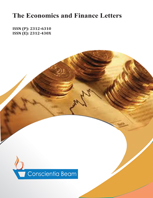Nexus of Monetary Policy on Economic Growth: A Study of Ghana
DOI:
https://doi.org/10.18488/journal.29.2021.82.251.265Abstract
The role of monetary policy instruments has not been explored by most researchers in Ghana; hence this study investigates the impact of monetary policy instruments on economic growth using time series data from 1990 to 2019. In testing for stationarity, augmented Dickey–Fuller and Phillips–Perron unit root tests were employed; Johansen cointegration and error correction mechanism were used in estimating the long- and short-run dynamic of the variables. The results obtained from the estimation revealed a positive and significant impact of money supply and exchange rate on economic growth for both long and short run. Moreover, monetary policy rate, interest rate, and inflation significantly affected growth rate negatively. The results also indicated a bidirectional causal linkage between money supply and growth rate. There was, however, a unidirectional relationship between interest rate and growth, between inflation and growth, and between monetary policy rate and growth in the long run. The study recommends that monetary policy authorities and the Bank of Ghana (BoG) introduce structural reforms and policies that will help create a favorable climate for both domestic and foreign investment. Again, BoG should keep interest rates, policy rates, and inflation in check to prevent shrinking of economic activities, since these have a direct influence on growth.

